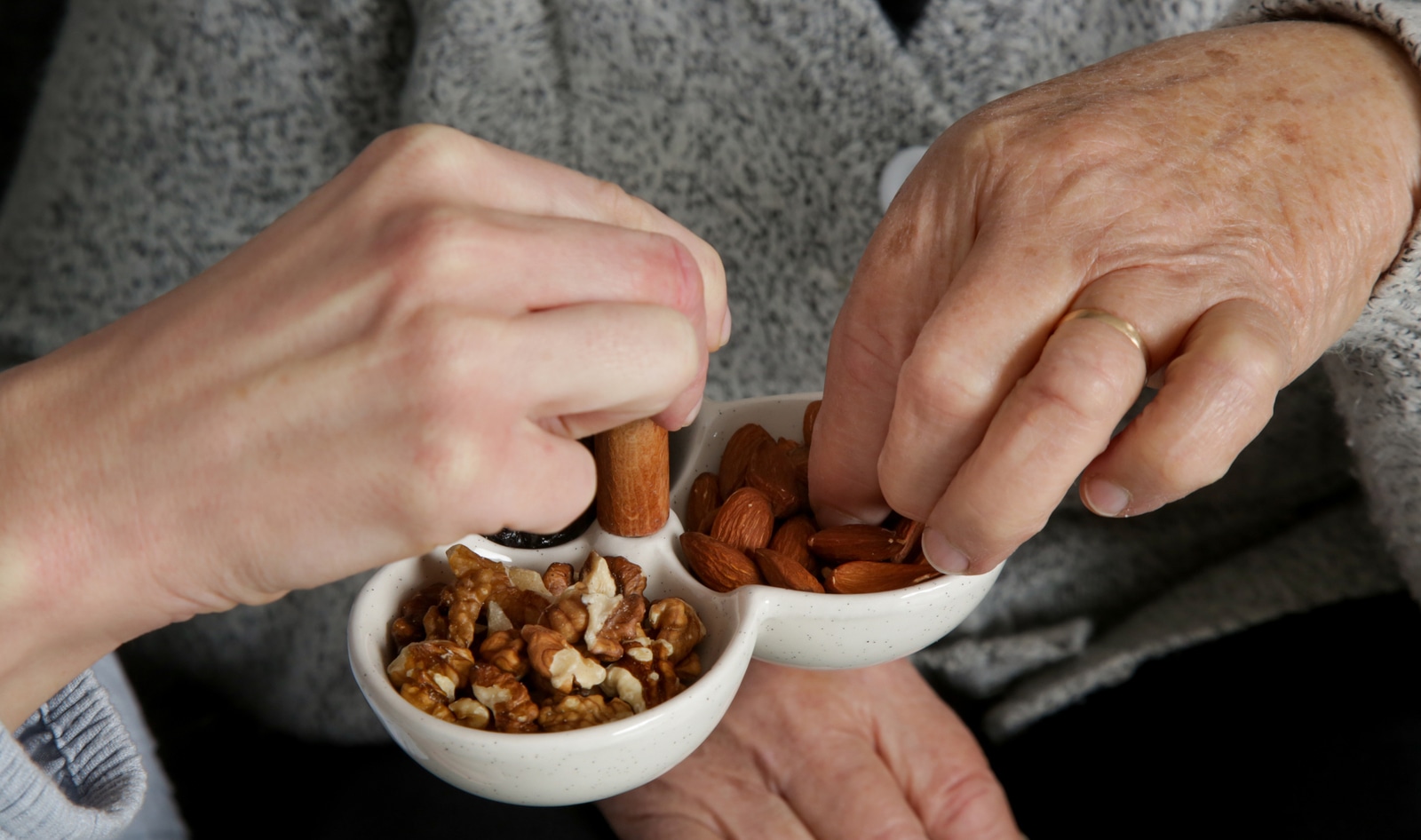We already know that a plant-based diet plays a major role in overall health but new research is uncovering how specific foods and dietary patterns are related with prevention of certain diseases.
A new study, titled “Plant-Based Dietary Patterns and Parkinson’s Disease: A Prospective Analysis of the UK Biobank,” was recently published in the journal Movement Disorders. This comprehensive research effort in the United Kingdom found that following a healthy plant-based diet is correlated with a decreased likelihood of developing Parkinson’s disease, particularly among the elderly population.
 Getty
Getty
According to the data collected in this study, eating a high amount of plant-based foods from three groups—namely vegetables, nuts, and tea—was shown to contribute to a minimized risk of developing Parkinson’s.
“These results are important to help refine and inform public health messages that consider plant-based diets and provide evidence that simple dietary change has the potential to reduce [Parkinson’s disease] risk,” the authors said.
Changing diet to slash Parkison’s disease risk
While plant-based diets are recognized for their role in reducing the risk of multiple chronic conditions like heart disease, diabetes, and some cancers, their impact on Parkinson’s—a neurodegenerative condition marked by tremors and movement difficulties—has remained less understood.
“The identification of modifiable [Parkinson’s disease] risk factors such as dietary and lifestyle factors may open new avenues for primary [Parkinson’s disease] prevention,” researchers from Queen’s University Belfast in the UK said in a statement.
Utilizing data from the UK Biobank—a long-term study aiming to uncover the roles of genetics and environment in disease onset—the team analyzed 126,283 participants (55.9 percent of whom were women). Over the course of 11.8 years of tracking, 577 individuals were diagnosed with Parkinson’s disease.
The research applied the Oxford WebQ dietary questionnaire to gauge the frequency and quantity of approximately 200 food items and 30 beverages consumed over 24 hours.
Healthy plant-based diet to fight Parkinson’s
A distinction was made between healthy plant foods (which include whole grains, fruits, vegetables, nuts, and protein alternatives) and unhealthy plant foods (such as fruit juices, sweets, and desserts). Animal-derived foods were categorized separately.
 Towfiqu Barbhuiya/Pexels
Towfiqu Barbhuiya/Pexels
Diets were categorized based on 17 food groups into an overall plant-based diet index (PDI), a healthful plant-based diet index (hPDI), and an unhealthful plant-based diet index (uPDI). Higher PDI and hPDI scores denoted diets abundant in plant-based foods, while higher uPDI scores indicated less healthy plant-based diets.
The research found that participants who scored high in the hPDI quartiles had a decreased risk of Parkinson’s, notably those in the third PDI quartile. Conversely, individuals in the highest uPDI quartile had a 38 percent increased risk of Parkinson’s compared to those in the lowest quartile.
A supplemental analysis adjusted for genetic factors revealed that those in the highest hPDI quartiles had a 25 percent lower Parkinson’s risk. Moreover, looking at specific foods, those with highest vegetable intakes had a lowered Parkinson’s risk of 28 percent while those who consumed the most nuts slashed risk by 31 percent.
 Massimo Rinaldi/Unsplash
Massimo Rinaldi/Unsplash
Meanwhile, people who consumed the highest amount of tea intake lowered their risk of the disease by 25 percent.
Higher scores in hPDI and PDI (signifying a greater consumption of plant-based foods) along with lower uPDI scores (indicating fewer unhealthy foods), were commonly found among participants who were of an older age, engaged in more physical activity, had a lower body mass index, and did not smoke.
Additionally, participants with higher levels of education and greater household income were also more likely to have diets rich in plant-based foods.
“Our novel study strengthens the knowledge around the health benefits of adhering to healthy plant-based dietary patterns, in this case, providing novel data that higher adherence reduces [Parkinson’s disease] risk,” the authors concluded.
UK Biobank uncovers benefits of plant-based diets
In addition to this study about Parkinson’s disease, two recent studies published using data from the UK Biobank have uncovered potential benefits of a plant-based diet.
 Pexels
Pexels
In one study, researchers examined the dietary habits of more than 117,000 participants from the UK Biobank initiative. The findings, published in the American Journal of Kidney Diseases, showed that those who consumed higher amounts of plant-based protein exhibited a notably reduced likelihood of developing chronic kidney disease (CKD).
These individuals also showed improved markers in blood pressure, body mass index, triglyceride levels, and inflammation.
This study also points to how dietary changes can significantly impact kidney health, important findings given that approximately 37 million American adults grapple with CKD.
Another recent study using UK Biobank data—conducted by La Universidad Autónoma de Madrid and Harvard T.H. Chan School of Public Health—explored the mortality impact of the Mediterranean lifestyle.
 Unsplash/Mary West
Unsplash/Mary West
The study utilized the Mediterranean Lifestyle index and focused on food consumption, dietary habits, and physical activity, among other factors. Results showed that adherence to a Mediterranean lifestyle led to a 29 percent lower risk of all-cause mortality and a 28 percent lower risk of cancer mortality.
Mercedes Sotos Prieto, the study’s lead author, emphasized that adopting the Mediterranean diet (characterized by high intakes of plant foods such as vegetables, nuts, seeds, and legumes) and lifestyle (plenty of exercise and social interaction) is possible for non-Mediterranean populations using locally available products.
“We’re seeing the transferability of the lifestyle and its positive effects on health,” Prieto said in a statement.
While the focus often lands on diet alone, both studies underscore the importance of a comprehensive approach to health. The Mediterranean study highlighted that while food habits are vital, aspects like physical activity and social habits were more strongly associated with reduced mortality rates.
Similarly, experts noted that the CKD study’s findings might be influenced by other healthy behaviors commonly found among individuals following a plant-based diet, such as physical activity.
For the latest vegan news, read:
JUMP TO ... Latest News | Recipes | Guides | Health | Subscribe









